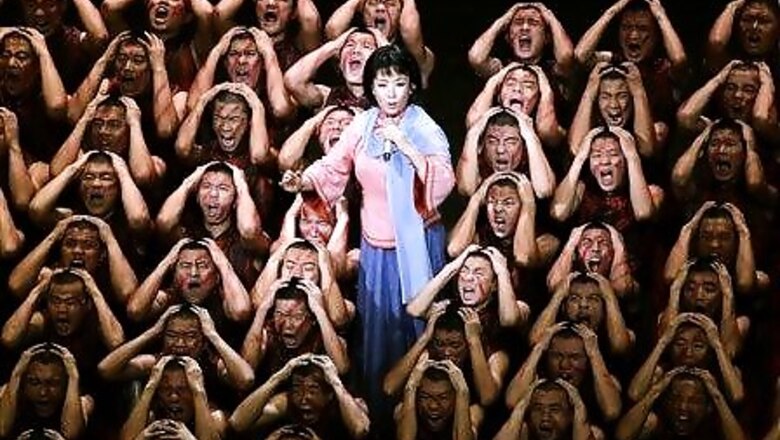
views
Beijing: A photo of China's new first lady Peng Liyuan in younger days, singing to martial-law troops following the 1989 bloody military crackdown on pro-democracy protesters, flickered across Chinese cyberspace this week. It was swiftly scrubbed from China's Internet before it could generate discussion online. But the image, seen and shared by outside observers, revived a memory the leadership prefers to suppress and shows one of the challenges in presenting Peng on the world stage as the softer side of China.
The country has no recent precedent for the role of first lady, and also faces a tricky balance at home. The leadership wants Peng to show the human side of the new No. 1 leader, Xi Jinping, while not exposing too many perks of the elite. And it must balance popular support for the first couple with an acute wariness of personality cults that could skew the consensus rule among the Chinese Communist Party's top leaders.
The image of Peng in a green military uniform, her windswept hair tied back in a ponytail as she sings to helmeted and rifle-bearing troops seated in rows on Beijing's Tiananmen Square, contrasts with her appearances this week in trendy suits and coiffed hair while touring Russia and Africa with Xi, waving to her enthusiastic hosts. "I think that we have a lot of people hoping that because Xi Jinping walks around without a tie on and his wife is a singer who travels with him on trips that maybe we're dealing with a new kind of leader, but I think these images remind people that this is the same party," said Kelley Currie, a China human rights expert for the pro-democracy Project 2049 Institute in Arlington, Virginia.
Peng, 50, a major general in the People's Liberation Army who is best known for soaring renditions of patriotic odes to the military and the party, kept a low profile in recent years as her husband prepared to take over as Communist Party chief. Her re-emergence has been accompanied by a blitz in domestic, state-run media hailing her beauty and charm, in a bid to harness the singer's popularity to build support for Xi at home and abroad. "Peng Liyuan: Let the world appreciate the beauty of China," declared the headline of a ChinaNews Service commentary that said the first lady's elegant manners, conversation and clothing would highlight Chinese culture. Her presence on diplomatic trips would demystify the firstfamily for the Chinese public, the commentary said. However, the government is stepping into little-charted and possibly treacherous waters for China.
In 1963, the glamorous Wang Guangmei, wife of President Liu Shaoqi, wore a tight fitting qipao dress to a state banquet in Indonesia. When the political tides turned against Liu four years later, radical Red Guards forced Wang to don the same dress and paraded her through the streets as a shameful example of capitalist corruption. Revolutionary leader Mao Zedong's wife, Jiang Qing, played a key role in the same radical campaign in which political opponents were mercilessly persecuted; after his death, she was put on trial and imprisoned, then moved to a hospital where she hanged herself.
The lifespan of Peng's Tiananmen image in the finicky world of the Chinese Internet has so far been short, and she remains a beloved household name with huge domestic popularity. The photo has circulated mainly on Twitter, which is blocked in China. The few posts on popular domestic microblogs did not evade censors for long. Many young Chinese are unaware that on June 3 and 4, 1989, military troops crushed weeks long pro-democracy demonstrations in Beijing with force, killing hundreds, possibly thousands, of people. Those who do know about the assault tend to be understanding of Peng's obligations as a member of a performance troupe in the all-powerful People's Liberation Army. At the time, her husband Xi was party chief of an eastern city.













Comments
0 comment